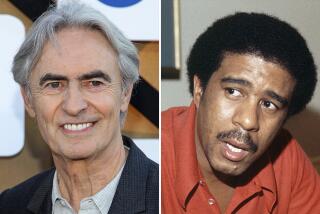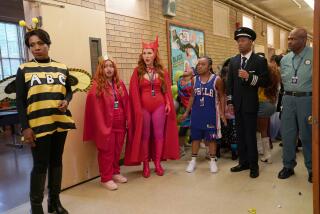Critic’s Notebook: The score on ‘South Park’: 1 for terrorists, 0 for free speech
- Share via
The terrorists won.
It’s become something of a joke, that line, overused to the point of banality, a punch line so easy a child can use it. But when Comedy Central decided to bleep mentions of the prophet Muhammad from a recent “South Park” episode because, and only because, an extremist website had made what amounted to death threats against co-creators Matt Stone and Trey Parker, the terrorists won.
Because that is the point of terrorism — to use acts of violence, in this case the murder of the Dutch filmmaker Theo van Gogh, who dared to make a film critical of Islamic society, as a continual and pervasive threat in order to change social and political policy.
In this case, that policy would be free speech.
Free speech has never meant you can say whatever you want. Regulation of content occurs all the time on television, where certain words and acts of sex, violence, vulgarity, racism and other forms of incitement to hate are not allowed.
There are rules, after all, even on cable. But “South Park” did not break any of them. Neither did the network’s decision to modify the content of the second half of a two-part episode, in which the prophet Muhammad was supposed to be inside a bear suit (actually Santa Claus was in there), come as the result of rational protest or conversation with Islamic watchdog groups.
No, it was made out of fear, for the lives of the show’s creators and perhaps the network executives who decided, basically, that the joke wasn’t worth the risk.
And so the creator, or creators, of what purports to be an Islamic extremist website was allowed to dictate American policy by taking free speech hostage.
Now, I’m no huge fan of “South Park,” a show I find occasionally funny, occasionally offensive and mildly irritating — mainly because I’ve spent hours explaining to my kids why they can’t watch it, even though it’s a cartoon. But it doesn’t matter, because what happened this week isn’t about “South Park” or even Comedy Central. It’s about whether we, as a society, are going to allow a group of crazy people to dictate what we see on television.
It was not just the brutal murder of Van Gogh that the bullies on this website used as a threat; it was, of course, the memory of 9/11. On that day, extremists hijacked not only planes but the power of television to terrorize a country so large and powerful they could never hope to wage, much less win, an actual war against it.
By claiming to be religious extremists, these particular bullies and murderers also hijacked Islam, just as those who have killed or terrorized physicians performing the legal act of abortion hijacked Christianity. Which is why, though it would be easy to dismiss this as just one in a string of those “South Park” controversies, it is much more.
If one group of crazy people claiming religious outrage is allowed to use the threat of violence as a way to control the public dialogue, what’s to stop every crazy person with an objection or a grudge or a website and too much time on their hands from doing the same? Certainly “South Park” has managed to offend every group of living organisms at one time or another.
Stone, Parker and other satirists court condemnation, disgust and even hatred because that is their job, that is the point of satire: to, by the act of offending, force society to contemplate its definition of offensiveness and, more important, acceptance.
It operates, by its very nature, at the far end of free speech. A good satirist steps over the line all the time; a great satirist moves or even erases it. Inevitably, mistakes are made, both in decisions to say and air certain things and to avoid or delete them. People are fined or fired, rules and guidelines are modified.
But the punishment is never death.
No doubt, the “South Park” numbers will jump in the next few weeks, and I suppose that’s one way of making a statement. But it is important for us to remember that the airwaves are just as vital and fragile as our airspace. And if we are serious about national security, it must protect our essence as Americans with the same dedication it protects our lives as Americans.
Free speech, in all its messy, profane, heretical, offensive, irritating and soul-stirring glory, built this country. And whether it’s “South Park” or the State of the Union, we, as a nation, must rise to defend it.
More to Read
The complete guide to home viewing
Get Screen Gab for everything about the TV shows and streaming movies everyone’s talking about.
You may occasionally receive promotional content from the Los Angeles Times.







